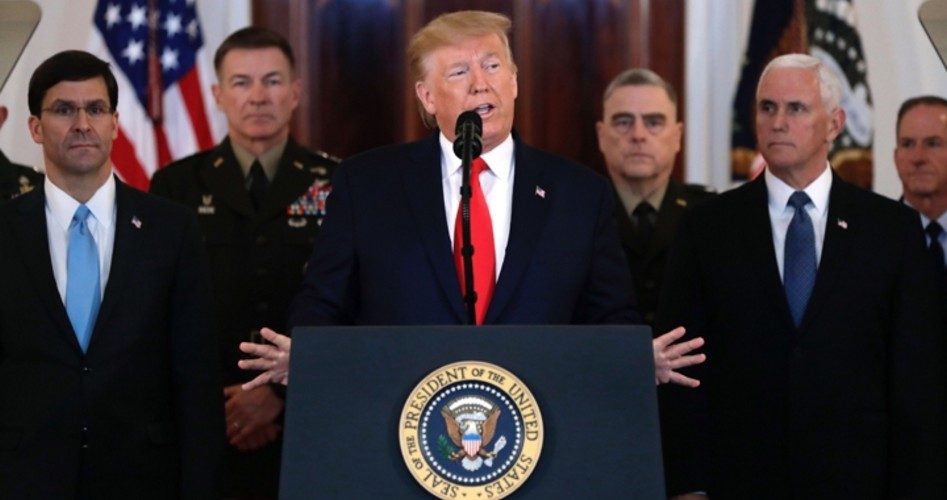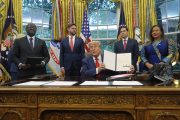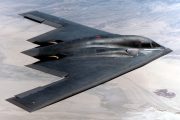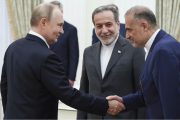
Iran fired as many as 15 ballistic missiles that targeted two air bases housing U.S. and coalition troops — in Irbil, northern Iraq, and al-Asad, in western Iraq, according to statements from Department of Defense officials on January 7. President Trump visited al-Asad last Thanksgiving.
“We are working on initial battle damage assessments,” officials said in a statement that did not mention casualties.
Iran’s state-run news agency, the ISNA, announced the attack and called it retaliation for the killing of General Qassem Soleimani in a drone attack in Iraq. Iran’s Supreme Leader Ayatollah Khamenei said the attack was “a slap in the face” for the United States and called for an end to the U.S. presence in the Middle East.
“This morning, courageous fighters of the IRGC’s Air Force launched a successful operation called Operation Martyr Soleimani, with the code ‘Oh Zahra’ by firing tens of ground-to-ground missiles at the base of the terrorist and invasive US forces,” the ISNA reported.
The BBC reported that Iraq’s Prime Minister Adel Abdul Mahdi said Iran warned him that an attack was imminent and that only areas with U.S. troops would be targeted. There were no reports of Iraqi casualties, Abdul Mahdi said.
However, a January 8 report from CNN contradicted this statement by citing “multiple administration officials,” who said “there is a growing belief among some Trump administration officials that Iran’s missiles intentionally missed areas populated by Americans when they targeted two Iraqi bases.”
The unnamed officials suggested that Iran may have chosen to send a message rather than take significant enough action to provoke a substantial U.S. military response.
The attacks represent the most direct assault by Iran on U.S. facilities since the seizing of the U.S. embassy in Tehran in 1979.
The BBC report cited Iran’s Revolutionary Guards, who said the attack was in retaliation for the death of General Qasem Soleimani, who was killed in a U.S. targeted airstrike at Baghdad International Airport on January 3.
White House Press Secretary Stephanie Grisham said President Trump had been briefed on reports of the rocket attacks “and is monitoring the situation closely and consulting with his national security team.”
The president delivered a televised address about the attacks from the White House’s Grand Foyer, on the morning of January 8.
“The American people should be extremely grateful and happy no Americans were harmed,” Trump said. “We suffered no casualties. All soldiers appear to be safe.”
“Only minimal damage was sustained,” the president continued. “Iran appears to be standing down, which is a good thing for all parties concerned and a very good thing for the world.”
Trump also suggested that the United States would refrain from further military action, but would instead impose additional economic sanctions on Iran.
“The United States is ready to embrace peace with all who seek it,” he said.
Photo: AP Images
Warren Mass has served The New American since its launch in 1985 in several capacities, including marketing, editing, and writing. Since retiring from the staff several years ago, he has been a regular contributor to the magazine. Warren writes from Texas and can be reached at [email protected].
Related articles:
Iraqi Parliament Votes to End U.S. Troop Presence in Iraq
Iraq Embassy Attack Illustrates Dangers of Continued Interventionism




